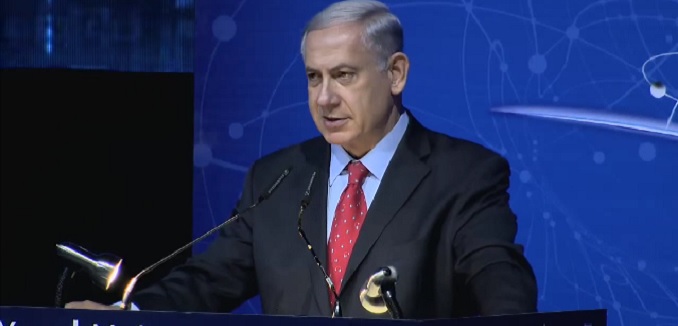A major foreign policy address given on Thursday by Israeli Prime Minister Benjamin Netanyahu – who in recent weeks has been politically strengthened by a growing consensus that the Jewish state emerged strengthened from its summer war against Hamas – saw the Israeli premier outlining Jerusalem’s posture on a range of regional issues and aligning the Jewish state with the United States and its traditional Arab allies against radical Sunni and Shiite antagonists in the Middle East.
Analysts have been reading the Middle East as split between those three camps for at least a year, with the traditional U.S. allies opposite the Iran-anchored Shiite camp opposite an axis of Sunni extremists that includes Turkey, Qatar, the Muslim Brotherhood, the Brotherhood’s Palestinian offshoot Hamas, and various other jihadist groups.
Netanyahu on Thursday emphasized both that Iran must be denied the means to acquire nuclear weapons – a scenario he described as the “ultimate terror” – and that Washington’s goal of degrading the Islamic State (ISIS) also had to be advanced. The Israelis have in recent days taken the lead in urging the U.S. and its allies to pool intelligence on the jihadist threat posed by ISIS, after reportedly having shared their intelligence with Washington. Netanyahu’s Thursday language on the issue was straightforward:
“The Islamic State, also known as IS and ISIS, is similar in ideology and strategy to Hamas, Hezbollah, al-Qaeda, Boko Haram, al-Shabab and other radical Islamist terrorist groups, Netanyahu said at a conference in Herzliya. “These groups must be fought. They must be rolled back and they must ultimately be defeated. That’s why Israel fully supports President [Barack] Obama’s call for united actions against ISIS.”
Netanyahu’s remarks echoed those of Israeli Foreign Minister Avigdor Lieberman, who on Wednesday declared that he “praise[d] the American initiative to take action and form a coalition against the Islamic State, and hope[d] those efforts will succeed.” The prime minister also hinted at what is widely thought to be extraordinary but covert U.S.-Israel intelligence cooperation, noting that the Israelis were “playing [their] part in this continued effort” and that “some of the things are known; some of the things are less known.” Washington’s Israeli and Arab allies are known to be urging Washington to pursue policies that roll back expansionism gambits by both ISIS and Iran.
[Photo: IsraeliPM / YouTube]




